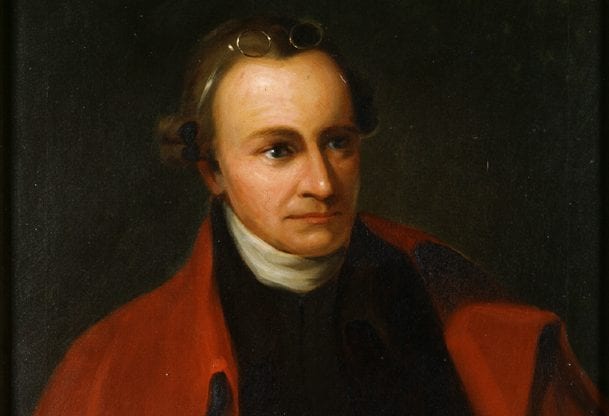Dear Sir:
…I congratulate you most sincerely on the accomplishment of what I know was the warmest wish of your heart, the establishment of American independence and the liberty of our country. We are now to rank among the nations of the world, but whether our independence shall prove a blessing or a curse, must depend on our own wisdom or folly, virtue or wickedness; judging of the future by the past, the prospect is not promising. Justice and virtue are the vital principles of republican government; but among us a depravity of manners and morals prevails to the destruction of all confidence between man and man. It greatly behooves the Assembly to revise several of our laws; to abolish all such as are contrary to the fundamental principles of justice, and by a strict adherence to the distinctions between right and wrong for the future to restore that confidence and reverence in the people for the legislature which has been so greatly impaired by a contrary conduct and without which our laws can never be much more than a dead letter. It is in your power, my dear sir, to do more good and prevent more mischief than any man in this State; and I doubt not that you will exert the great talents with which God has blessed you in promoting the public happiness and prosperity…
The people in this part of the country are made very uneasy by the reports we have from below, that the Assembly will make some laws or resolutions respecting British debts which may infringe the articles of the peace, under the mistaken idea that Great Britain will not risk a renewal of the war on account of such terms an infraction of the treaty. We see by the late public papers that the terms of peace with America are so strongly censured in both houses of Parliament, that it has occasioned or will occasion a total change in the ministry. A new ministry averse to the treaty, or even the ministry who concluded it, might resent or avenge any infraction of its provisions in any particular State, by reprisals upon the ships or coasts of such State, or by sending two or three frigates to intercept their trade, without danger of involving themselves in a new war; for the power of war and peace and of making treaties being in Congress and not in the separate States, any such act would be considered as an unwarrantable assumption of power in the State adopting it; and we have no reason to expect that either the late belligerent powers in Europe, or even the American States in general, would make a common cause of it. It is easy to foresee that, in such an event, our situation would be neither safe nor honorable. Had it been in the power of the American commissioners (which it certainly was not) to have abolished the British debts here, it would have been short-sighted policy to have done so. The far-fetched arguments which have been used to show the distinction between this and other wars, would not have been approved or comprehended, by the bulk of mankind; and with what degree of confidence would foreign merchants have ventured their effects here, if upon any national quarrel they were liable to confiscation? I could have wished, indeed, that some reasonable time had been allowed for the payment of the British debts, and that the interest on them had been relinquished. As to the first, the desire of the British merchants to reinstate themselves in their trade here will probably prevent their pressing their debtors, and as to the last, their bond-debts only will carry interest. It is notorious, that the custom of giving interest upon common accounts was introduced by the partiality of the merchants of whom the jurors at the general court were chiefly composed for several years before the late Revolution. Under our present circumstances, I think the accounts of the British creditors may be safely trusted to the Virginia juries without any interposition of the legislature. In conversation upon this subject we hear sometimes a very absurd question: “If we are now to pay the debts due to British merchants, what have we been fighting for all this while?” Surely not to avoid our just debts or to cheat our creditors; but to rescue our country from the oppression and tyranny of the British government, and to secure the rights and liberties of ourselves and of our posterity, which we have happily accomplished. The ministry in Great Britain and the Tories here have indeed constantly accused us of engaging in the war to avoid the payment of our just debts; but every honest man has denied so injurious a charge with indignation. Upon the whole we have certainly obtained better terms of peace than America had cause to expect; all the great points are ceded to us, and I cannot but think it would be highly dangerous and imprudent to risk a breach of it.
The people here too are greatly alarmed at a prevailing notion, that those men who have paid the British debts into the Treasury in depreciated paper money, instead of making up the real value to their creditors, will now attempt to throw the difference upon the shoulders of the public and raise it by taxes upon the people. I should hope that such an iniquitous scheme will be rejected with the contempt it deserves. If it is adopted it will probably cause some violent convulsion; the people being determined, in many parts of the country, to form associations against it, and to resist the payment of any taxes imposed on them for discharging the private debts of individuals…



